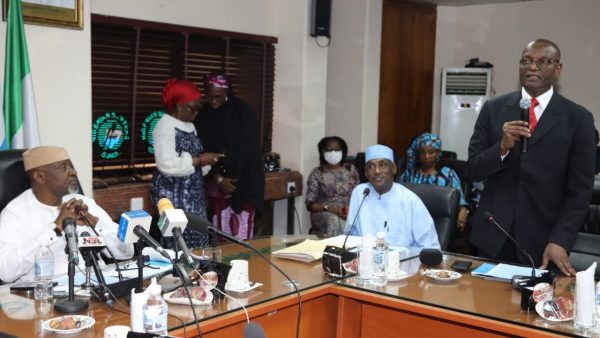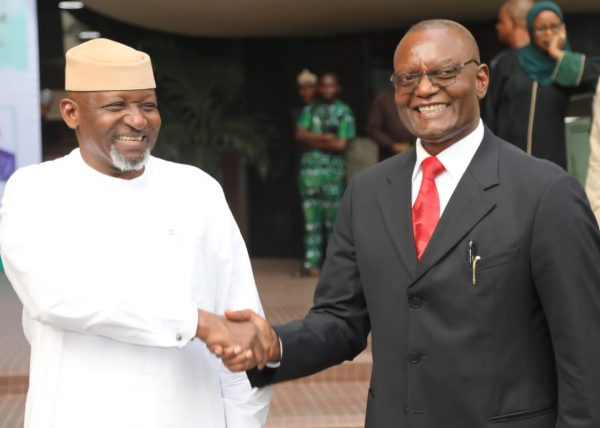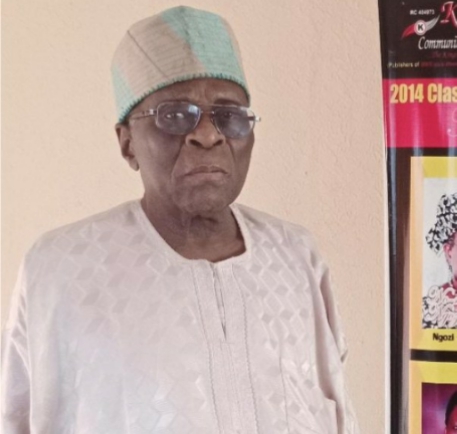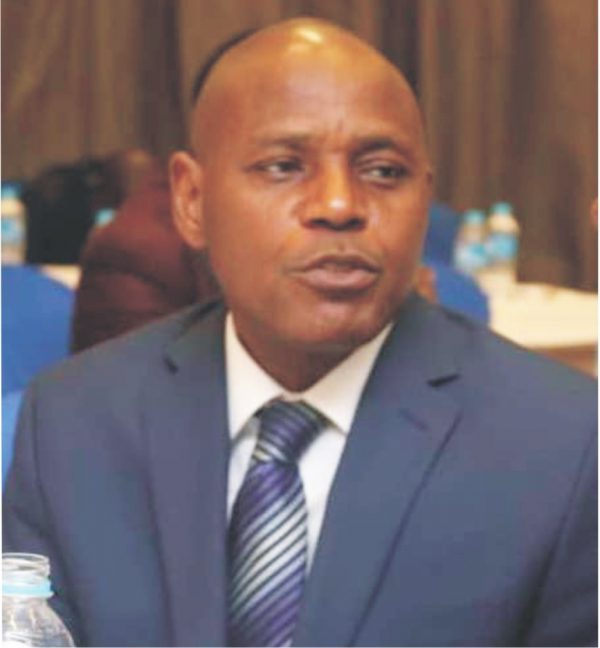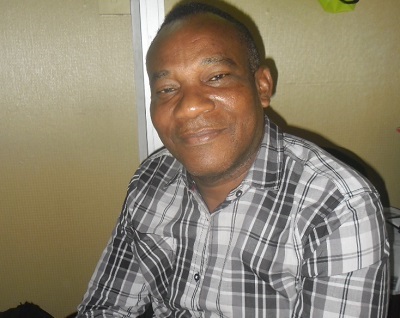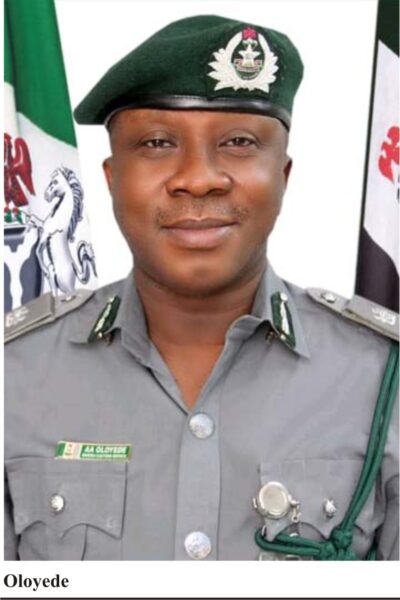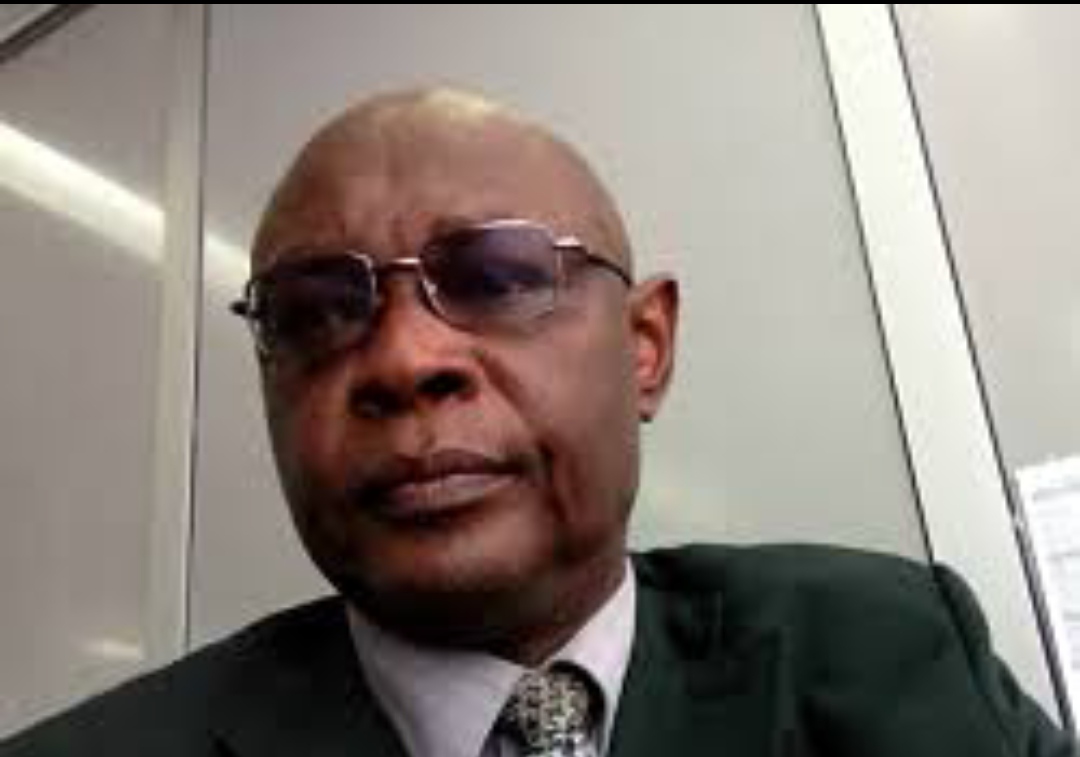Why I Directed Shippers’ Council To Review Port Concession Agreements- Transport Minister
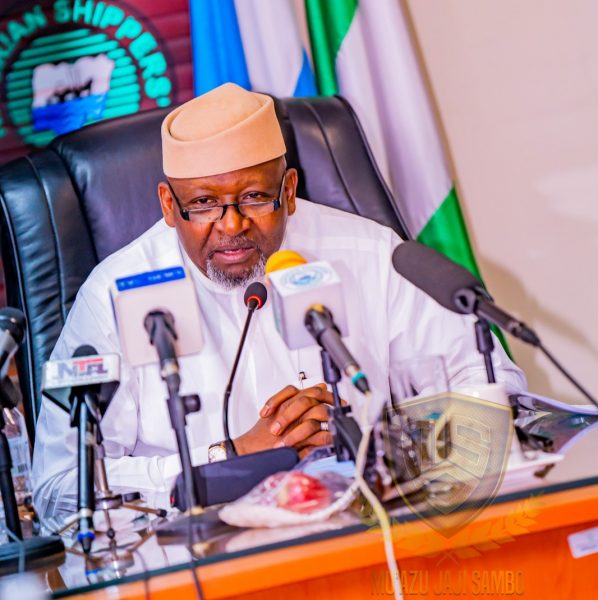
The Minister of Transportation, Muazu Jaji Sambo, last week, visited the Nigerian Shippers’ Council(NSC). This is his last place of visit among the parastatals in the maritime industry. His predecessor, Hon. Rotimi Amaechi also reserved NSC for the last. Why? Is this a coincidence or a deliberate leadership action? Like Amaechi, Sambo made some wall-breaking policy statements that got the maritime industry trembling. Some stakeholders have been taking cover since his earth-moving declarations. Perhaps, some found solace in the fact that his tenure is already at the departure lounge. But what if Sambo returns as Transportation Minister? He believes in the efficacy and philosophy of low-hanging fruits which has become his driving impetus, given that as a realist that he is, he knows he came in at an injury time but a good leader gives no excuses as alibi for failure. He must be remembered as a Minister that sought and achieved milestones with low-hanging fruits. He shared some thoughts with the media and members of the NSC management and board. Enjoy it!
Why I Chose To Visit NSC Now
My visit to the Nigerian Shippers’ Council is deliberate and strategic.
I know the role that you ought to play in the maritime sector of the Nigerian economy. That role has not received the kind of encouragement that it ought to have received in the recent past. So, I said I will not visit you until I have the need to do that. And by the grace of God we were able to subdue very powerful forces and opposition against the Cargo Tracking Note (CTN). It came with the mandate to include all exports Other departments of government made proposals to Mr. President to be allowed to track oil cargo. Mr. President is one person who never has interest in anything that is brought to him. From my little experience of interacting with him, I am going to say that this country may hardly have someone of his nature in terms of detaching himself from anything governmental. No pecuniary or selfish interest. The president said the responsibility of implementing CTN should be transferred to the traditional role holders of CTN, which is the Federal Ministry of Transportation(FMOT). So, the FMOT is saddled with the responsibility through the Nigerian Shippers’ Council. We therefore have to ensure that the confidence Mr. President has placed in us is not misplaced. And I dare say that it is a very heavy responsibility. You have to hit the ground running. This brings me to the question: Is NSC ready in terms of automation to implement electronic cargo tracking note? I believe it is from what I have seen today.
Inland Dry Port Projects
I am also very happy to have recorded significant achievements in one of your core mandate areas: The inland dry ports. Please, I want to urge you, within the next three months let’s us move to other designated areas like Jos, Aba and Ibadan. Please, take note of the challenges of these dry ports. If there are challenges, let’s overcome them. So Mr. President and his administration can go home satisfied that all the dry ports are working before the end of this administration.
NSC Amendment Bill
The NSC amendment bill, I am still waiting for the committee report to come to me. I have robust relationship with the Attorney General of the Federation and the National Assembly. I want to assure you that once you complete your work and bring it before me,we will get it behind us before the end of this administration.
On the 1 per cent stabilisation levy, Iam happy that the committee has completed its work and the report will be on my desk soon. It is statutory and your right by law. In fact, I am wondering why it has taken this long. We will get this behind us very soon.
Disbursement Of CVFF
Another milestone achievement is Mr. President’s approval for the Cabotage Vessel Finance Fund( CVFF). And I would like to call on NSC to get together stakeholders; indigenous ship owners and vessels owners in cabotage trade and encourage as many of them as are qualified to apply for this loan. Let me see which company will be the first to receive the cheque. We are going to go live on electronic channels for the whole world to know that it is a reality. I hope that we will be able to do the disbursement in the month of March. By the grace of God I have given NIMASA all the freedom to operate in accordance with the law and the regulations guiding the disbursement. Mine is to approve and certify the conditions.
The banks have a role because not only are they Primary Lending Institutions( PLI) their role is also participatory agents in the sense that they will contribute 35 per cent of the amount required by each applicant. The applicant deposits 15 per cent and NIMASA pays the 50 per cent, making it 100 per cent. One of the things I want to say is that if we identify a ship owner who has a contract, it means it will make it possible for the person to pay back easily. So in this case a mechanism has to be put in place by banks to pay directly to customers account. We want to avoid the past mistake of the Ship Building and Ship Acquisition Fund(SBSAF) that failed because those lent money did not pay back. This time around, we want to ensure that he who borrows must pay back.
100 Per Cent Examination Of Goods By Customs
One of the sore points of the ease of doing business in our ports is the issue of 100 per cent physical examination. We should try and put it behind us. And the onus is on you, NSC the port economic regulator to ensure that Customs eliminates this trend. And where you have challenges, write to the Minister. I will move across to see the CG of Customs in his office to resolve it.
Connecting IDPs With Rail Corridor
NSC your IDPs will only make sense when the rail lines are working. The onus is also on you to sit with the Nigerian Railway Corporation (NRC) and drive them. If they are not performing because of insecurity; ask what they are doing about insecurity. So, IDPs can only succeed to the extent that there is rail corridor.
Establishing The Port Community System
I want to give you one assignment and that will be our major take away today. The port community system, it is a shame that even smaller countries like Benin Republic have a port community system working for them and the giant of Africa does not have any. You are the economic regulator of the port. You are the regulator of all the agencies
that have anything to do with the port. I think the responsibility is on you. I think that the problem is that we have not been able to place the responsibility on anybody that we can hold responsible. Next week I am going to convene a meeting of all the maritime agency heads to devise a working mechanism on the port community system. We must have this before this administration comes to a close. It is not a rocket science to have a PCS. So, I will hold you responsible for giving me a PCS before May 29.
Let us look at a country that has the PCS working for them and just replicate the system in Nigeria. If it is working for them why can’t it work for us? It is a question of direct procurement, we are not going to circumvent the law of the land. The public procurement Act gave us the opportunity to do direct procurement. So, if we have a system that goes very well in Benin Republic here, we can go there and pick it up and get presidential approval for direct procurement and replicate it. How can Nigeria with over 200 million people and largest Gross Domestic Product (GDP) in Africa not have a port community system? It is unacceptable! So, you need to coordinate this. I have given you that role today.
And I want the media to tell the whole world loud and clear that the Minister of Transportation, exercising the power conferred on him by all extant laws has appointed the NSC as the regulator of the ports to establish the port community system before the end of this administration.
There is something that disturbs me and also most people who import good into Nigeria. That is terminal charges! Do you have a template for terminal charges?
I have just been informed that the PCS that NPA has been collaborating with IMO to berth that nowhere in West African countries has any port authority been involved in deployment of PCS. Why should they be involved in Nigeria?
If they want to be involved in Nigeria, why is it taking them donkey years to actualize? I respect IMO and that is why we are proud to have IMO Secretary General in Nigeria. But there are some things that we must do our own way. Any agency or institution that wants to derail the progress of this country must be resisted.
Back to terminal charges, do you have an approved charges for this terminal operators?
( A respondent echoed yes from the management team of NSC)
I have received too many complaints about the terminal operators applying high charges.
Monitoring Performance Of Terminal Operators
If you have a template, ensure that the charges are adhered to. Another thing is enlightenment. You will have to enlighten Nigerians on this through the media that they can come to you to report any terminal operator who charges exorbitant fee.
Another important point I want to make is that NPA should not have given the Ministry the renewal of the leases of the concessions without an input from NSC. Now, there seems to be some contradictions
( At this point NSC management and the Ministry officials were making explanation on why NSC was dropped).
It is even better that NSC was dropped at this point as the economic regulator so that you don’t become a judge in your own case. When they rounded up everything they out to have sent them to you through the Ministry for you to review and comment as well as make recommendations. Upon your recommendations, send the memoranda to us for the Federal Executive Council. I think this is the path we must toe now. You are now going to do the review terminal by terminal now. You must not lump all the terminals and bring to me. For each terminal, you will look at the original agreement; look at the key performance indicators(KPIs) they are supposed to meet, including development plans, port traffic, revenue, the obligations. How have they performed?
There should be a table, everything should be clear on where we were at 2006 and where we are today. Have we achieved what we are set to achieve? The port reform is meant to achieve what? Efficiency, increased cargo, revenue, among others. So for each terminal that is due for renewal we must look at this KPIs. And then score them with verifiable data which you must attach as annexure. Where a terminal operator’s concession should not be renewed you must be bold enough to say it should not be renewed because they have not been able to match the target set for them. We will look for other Nigerian operators who should be ready to meet this target. You must not be blackmailed by anybody. Every Nigerian is entitled to run a terminal if he has the capacity. They were lucky that these things were given to them almost at free of charge in 2005/ 2006. There was no Bureau of Public Procurement(BPP) and many others. BPP came in 2007 and now you must go through the procurement process. I have given you this work. That means you should start working now before I write you. Get the concession agreement of 2006 and identify what the KPIs are and log in everything into your system. This is not an exercise that we should take lightly at all.
These are two key assignments I have given NSC today.
NSC now have my full support as Port Economic Regulator. So, you have to walk the talk and if you encounter any opposition let me know.
How Naira Redesign Will Clean Up Nigeria
However, let’s us discuss the Naira redesign policy of Mr. President. He means well. We need to create awareness. I said earlier on that I don’t think we can have another president like him in terms of dislike for pecuniary and selfish interest. The implementation of the policy was hijacked I was told how a big wig mopped up the new currency in billions as soon as it was announced. If that was not allowed the masses would not be suffering today. There is need to empathize with Nigerians who are suffering over this. I believe the President is right. Nobody has the kind of information the President has, so if we can trust him, this reform will clean up the system.
How CTN Will Impact Common Man
On how the common man on the street will benefit from CTN implementation, the electronic cargo tracking note over a period of 15 years will roughly give us revenue in the region of 1.5 billion dollars. The implementation of the scheme will also help Nigeria in indirect revenue over the period amounting to about an estimated sum of 33.4 billion dollars.
This indirect revenue will be mainly due to loss prevention as additional benefits this scheme will give Nigeria are: It will improve greatly safety and national security; it will generate real time cargo import and export statistics and establishment of cargo statistics bank for Nigeria, which NSC is doing now but not on a scale that is more efficient or as accurate as cargo tracking will give you.
It will also generate trade intelligence and facilitate risk management and fraud control; it will provide cargo tracking information alert; it will also provide a tool for full compliance with the SOLAS and ISPCS code and enhance safety of life and cargo security. It will also reduce the cost of doing business in Nigerian ports by minimizing certain logistics processes like physical examination of goods; It will provide verifiable information on all shipments; it also provide harmony in cargo processing and clearance procedure ; it will provide data back up for all the ethical implementing agencies; deployment of full CTN and e-commerce technology for virtual interaction thus minimizing physical contacts amongst port operators and users; improving clearance time and eliminating surcharges such as demurrage. This last point is one area the common man will benefit from because whatever cost an importer incurs is transferred to the consumer. So the less it costs me to import the lower my cost to the consumer because ultimately I want to sell as quickly as possible and turn over and turn around the money.
Why Port Infrastructure Repairs Is Delayed
The quay apron at Tin Can Port is of serious concerns to me. Don’t forget, that was my first place of visit on assumption of office. Well, when you identify a problem and you don’t see anything physically happening it creates the impression that the matter has been forgotten. We have the quay apron and quay wall problem in TinCcan island. We have collapsed quay wall problem also at Onne port, we have the challenge of breakwaters at Warri Escravos. These are dilapidation that will cost us millions of dollars. We must go through the entire process of public procurement Act as required by law. We cannot cut corners. First of all, we have to make sure that we have the correct structural designs, we have to make sure that the cost are well made ; we have to be sure that every survey is done whether biometric or hydrological. And at the end of the day, this must go to the Federal Executive Council. Above all,, does NPA have the resources in hundreds millions of dollars for it now? The answer is No. So we are looking at major options of financing such major rehabilitations. They will have to resort to borrowing. And if you must borrow, you will borrow in such a way that you will not distort the revenue flow of government and ensure that you are not borrowing at a huge cost. The good news is that NPA earns harbour dues in dollars so most financial institutions will be very happy to finance such projects. I know NPA is talking to AfriExim bank for example, and they are also talking to some local banks, may be NEXIM bank and others. They are also looking at the options of doing through ECPF, that is, Engineering Construction Plus Financing, by contractor or directly by NPA . And then, how do you pay back in either of the cases? All these are happening right now as I speak. NPA is almost concluding this process. I am aware that the managing director made a visit to Permanent Secretary, Ministry of Finance, Budget and National Planning to discuss all these options with him.
There are certain conditions that AfriExim bank has put forward. Three key conditions. I know that two of them are very easy to meet. The third one involves Sovereign Guaranty and we needed to clear that. You need to know this information for you to know that we are doing a lot behind the scene so that by the time we get to the right solution we will then come to you after the necessary approvals are obtained. Now, whether this will happen while I am still Minister of Transportation, I cannot guarantee because different key players are involved. But we are doing our best to make sure that we hasten the process and if possible get the approvals before time runs out. If we have to hand over this baton to the next set of people, I can assure you that we have fallen our arms because we know the risk involved in not attending to this dilapidated infrastructure.
Banks’ Apathy For CVFF
On how the banks have seemingly shun concerns regarding the CVFF, in my remarks here I said the CVFF set out to avoid the pit-falls of the past, where the beneficiaries of this fund don’t pay back and that is why it is now only three parties that contribute.
The applicant for the loan will bring 15 per cent of the cost of acquiring the vessel, the banks will provide 35 per cent, NIMASA will have to provide 50 per cent of the balance. I also mentioned that the banks will do their credit risk assessment. And if I was a banker, one of the major criteria for assessing my risk will be – has the applicant got an off-taker? In other words, does he have an existing contract? If he has the contract he can attach it as part of his submission. If for instance, I have an International Oil Company (IOC) who is going to take the vessel for 5 to 10 years and there will be domiciliation of payment directly from the IOC to applicant’s account with the Primary Lending Institution(PLI), there is no PLI that will not be happy to lend money when they know that the money will be paid back because they earn interest on such money.
So repayment is guaranteed not only because the bank is a stakeholder in the loan, also because they will carry out detailed risk assessment before recommending the application through NIMASA who will then recommend to the Minister for approval. I think those concerns should not be in place at all because all the measures have been put in place to eliminate them.
Boko Haram’s Renewed Threat On Rail Abuja-Kaduna Corridor
Regarding the threat on the Abuja- Kaduna rail line, yes indeed, the Ministry of Transportation has received a letter from the Department of States Services(DSS) whose responsibility it is to gather intelligence for the security and well being of the country about potential Boko Haram threat to attack the rail corridor as happened on March 28, last year. Upon receipt of that notification we immediately wrote to the Minister of Defence. As you know, the Minister if Defence oversees the Armed Forces and it is the responsibility in addition to Nigeria Police to secure Nigerians. We are aware that the Minister of Defence chairs the Committee put in place to examine what happened prior and after the March 28 incident and to put in place every measure necessary to ensure that working with the Ministry of Transportation such an incident never occurs again. That was why we referred this to the Minister of Defence requesting him to convene an urgent meeting of all stakeholders including the Nigeria Police, whose primary responsibility it is to protect Nigerians and critical national infrastructure from any threat whatsoever. That meeting has been held and action has been taken and I want to assure all of you here and Nigerians that whatever it is that we need to do, we have done. And we will continue to do because we review it on daily basis to ensure that what happened on March 28 will never happen again.
Using Technology To Tame Terrorism On Rail Lines
I can repeat here some of the measure we put in place. For example, we did not have customers profiling in place before March 28, nobody boards the train without identity disclosure. Now, attack on train will not be possible without some accomplices inside the train. If such evil- minded people are prevented from boarding the trains, the only option they will have is to try and plant some mines on the corridor but we have a system in place that will not let them do that. Five kilometers away from that track we know when you are coming towards it. We set up monitoring devices; we have online real time monitoring of the track; the driver can see the track two kilometers ahead of him and if he applies his break he has 800 metres before the train will stop. He still has about 1001 kilometers before arriving at that threat in case they decide to plant the mine as the train gets closer to them. And there is no way the mine will be placed there and our censor will not pick it. In addition to technology, we have responders, those will respond to such threats. Above all, we have put in place a robust system that involves the local communities who will now own that asset. They will feel that this asset belongs to them and should not let any threat to it happen when they are there.
On National Single Window
On the single window, our ultimate objective is the national single window. The first objective for us here in the maritime industry is to have a port community system. If all of us have a functional port community system, the Nigeria Customs Service(NCS) has e-customs and so by the time, we have a port community system working all we need to do is to integrate the two and any other and a national single window will emerge. That is why I did not hesitate in giving the NSC the task of ensuring that we have a port community system in place before this administration winds up. I would like us to commission it in April this year. And it is doable .
Can Barge Operators Access CVFF?
On barge operators access to CVFF, if you look at the Coastal and Inland Shipping Act( Cabotage Act) of 2003 and the regulations thereof you will be able to identify those who can access the CVFF. If barge operators are qualified I will be the first to put them forward and make sure they get the funds. I know I have said it before that I will not encourage movement of cargo to and from Lekki Deep Sea port by road. We don’t want to create another Apapa in that axis.
Building Barges Locally
The Lekki Deep Sea port management has informed me that they are focusing on transshipment now when they visited me recently. I think that we have sufficient local capacity to bring as many barges as that port will require . I have had conversation with some local producers of barges, they have done a vessel template and I am trying to see how we can encourage them to mass produce them. And if you know many other stakeholders that can do this please, bring them forward. And that is why I called on NSC to have an engagement with their stakeholders and encourage them to access the CVFF, which has been approved for disbursement.



